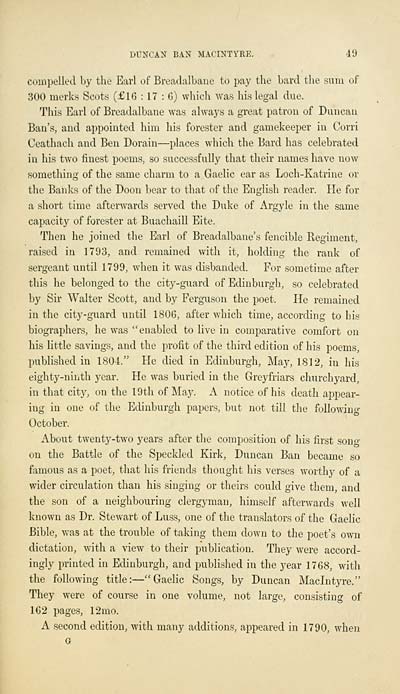Download files
Complete book:
Individual page:
Thumbnail gallery: Grid view | List view

DUNCAN BAN MACINTYRE. 49
compelled by the Earl of Breadalbane to pay tlie bard the sum of
300 mevks Scots (f 16 : 17 : G) wliich was his legal due.
This Earl of Breadalbane was always a great patron of Duncan
Ban's, and appointed him his forester and gamekeeper in Corri
Ceathach and Ben Dorain — places which the Bard has celebrated
in his two finest poems, so successfully that their names have now
something of the same charm to a Gaelic ear as Loch-Katrine or
the Banks of the Doon bear to that of the English reader. He for
a short time afterwards served the Duke of Argyle in the same
capacity of forester at Buachaill Eite.
Then he joined the Earl of Breadalbane's fencible Regiment,
raised in 1793, and remained with it, holding the rank of
sergeant until 1799, when it was disbanded. For sometime after
this he belonged to the city-guard of Edinburgh, so celebrated
by Sir Walter Scott, and by Ferguson the poet. He remained
in the city-guard until 1806, after which time, according to his
biographers, he was "enabled to Hve in comparative comfort on
his little savings, and the profit of the third edition of his poems,
published in 1804." He died in Edinburgh, May, 1812, in his
eighty-ninth year. He was buried in the Greyfriars churchyard,
in that city, on the 19th of May. A notice of his death aj^pear-
ing in one of the Edinburgh papers, but not till the following
October.
About twenty-two years after the composition of his first song
on the Battle of the Speckled Kirk, Duncan Ban became so
famous as a poet, that his friends thought his verses worthy of a
wider circulation than his singing or theirs could give them, and
the son of a neighbouring clergyman, himself afterwards well
known as Dr. Stewart of Luss, one of the translators of the Gaelic
Bible, was at the trouble of taking them down to the poet's own
dictation, with a view to their publication. They were accord-
ingly printed in Edinburgh, and published in the year 1768, with
the following title: — "GaeHc Songs, by Duncan Maclntyre."
They were of course in one volume, not large, consisting of
162 pages, 12mo.
A second edition, with many additions, appeared in 1790, when
G
compelled by the Earl of Breadalbane to pay tlie bard the sum of
300 mevks Scots (f 16 : 17 : G) wliich was his legal due.
This Earl of Breadalbane was always a great patron of Duncan
Ban's, and appointed him his forester and gamekeeper in Corri
Ceathach and Ben Dorain — places which the Bard has celebrated
in his two finest poems, so successfully that their names have now
something of the same charm to a Gaelic ear as Loch-Katrine or
the Banks of the Doon bear to that of the English reader. He for
a short time afterwards served the Duke of Argyle in the same
capacity of forester at Buachaill Eite.
Then he joined the Earl of Breadalbane's fencible Regiment,
raised in 1793, and remained with it, holding the rank of
sergeant until 1799, when it was disbanded. For sometime after
this he belonged to the city-guard of Edinburgh, so celebrated
by Sir Walter Scott, and by Ferguson the poet. He remained
in the city-guard until 1806, after which time, according to his
biographers, he was "enabled to Hve in comparative comfort on
his little savings, and the profit of the third edition of his poems,
published in 1804." He died in Edinburgh, May, 1812, in his
eighty-ninth year. He was buried in the Greyfriars churchyard,
in that city, on the 19th of May. A notice of his death aj^pear-
ing in one of the Edinburgh papers, but not till the following
October.
About twenty-two years after the composition of his first song
on the Battle of the Speckled Kirk, Duncan Ban became so
famous as a poet, that his friends thought his verses worthy of a
wider circulation than his singing or theirs could give them, and
the son of a neighbouring clergyman, himself afterwards well
known as Dr. Stewart of Luss, one of the translators of the Gaelic
Bible, was at the trouble of taking them down to the poet's own
dictation, with a view to their publication. They were accord-
ingly printed in Edinburgh, and published in the year 1768, with
the following title: — "GaeHc Songs, by Duncan Maclntyre."
They were of course in one volume, not large, consisting of
162 pages, 12mo.
A second edition, with many additions, appeared in 1790, when
G
Set display mode to: Large image | Transcription
Images and transcriptions on this page, including medium image downloads, may be used under the Creative Commons Attribution 4.0 International Licence unless otherwise stated. ![]()
| Early Gaelic Book Collections > Ossian Collection > Selections from the Gaelic bards > (73) |
|---|
| Permanent URL | https://digital.nls.uk/78070425 |
|---|
| Description | Selected books from the Ossian Collection of 327 volumes, originally assembled by J. Norman Methven of Perth. Different editions and translations of James MacPherson's epic poem 'Ossian', some with a map of the 'Kingdom of Connor'. Also secondary material relating to Ossianic poetry and the Ossian controversy. |
|---|
| Description | Selected items from five 'Special and Named Printed Collections'. Includes books in Gaelic and other Celtic languages, works about the Gaels, their languages, literature, culture and history. |
|---|

